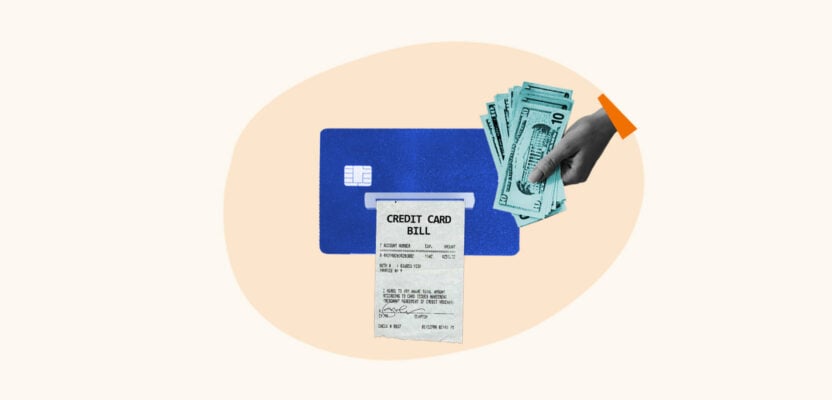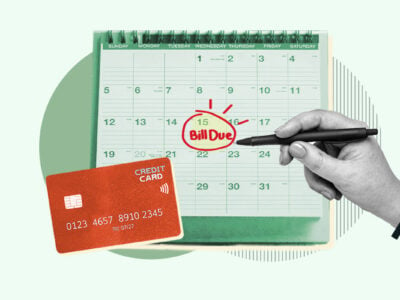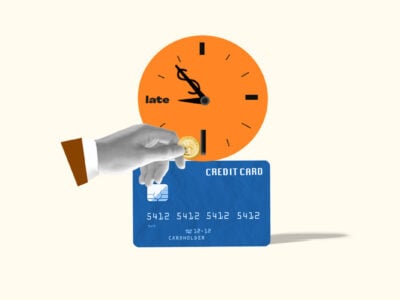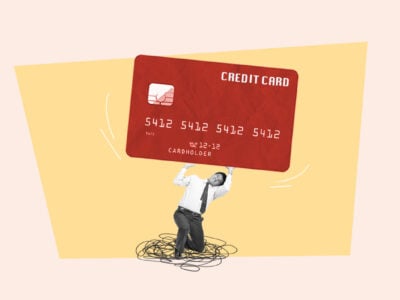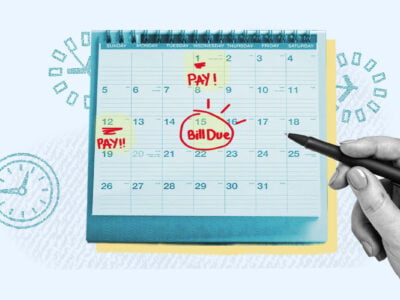Using a credit card is as easy as swipe, tap, or insert, right? Not quite. Using a credit card in a store is one thing, but paying your credit card balance back afterwards is its own beast. You need to know how much you actually owe, what you can (and want to) pay, and how to make those payments on time.
Learn the ins and outs of paying your credit card bill so you can sidestep financial pitfalls and raise your credit score. Here are the three steps you need to take to pay your credit card bill the right way.
Table of Contents
Step 1: Understand how much you owe
Before making a credit card payment, you need to understand your credit card bill. Regardless of whether you get your credit card statement in the mail, check your account online, or go to your app, you’ll probably encounter the following three terms:
- Statement balance
- Current balance
- Minimum monthly payment
Let’s dive into what each of these terms means and how they affect your current credit card balance.
Statement balance
Your statement balance is the total amount you owe from your most recent credit card billing cycle. It’s calculated on your statement closing date (the last day of the billing cycle) and includes:
- Charges you made during the billing cycle
- Unpaid debts from previous billing cycles
- Interest charges
- Fees on your account (like your credit card’s annual fee)
Your statement balance is due by the coming payment due date. However, you don’t necessarily need to pay the full bill, just a certain minimum amount (described below). If you don’t pay your entire statement balance, you won’t be violating any credit card terms or incurring late fees, but whatever you leave unpaid will begin accruing interest.
Current balance
Your current balance and statement balance are different, contrary to popular belief. Your current balance is whatever you owe as of right now, not what you owed on your last statement closing date.
It’s the total of what you owe on your credit card, but it isn’t tethered to a specific due date, as it changes every time you charge to or pay off your credit card.
In other words, your current balance is your last statement balance plus any charges and minus any payments you’ve made since the statement closing date.
Minimum monthly payment
Your minimum monthly payment is the amount that’s officially due by the coming payment due date. Your minimum monthly payment is determined by your statement balance. It will be a certain percentage of that amount.
If you don’t pay your minimum monthly payment by the due date, you may face:
- Late fees
- A penalty APR (a punitive hike in your normal interest rate)
- Derogatory marks such as late payments appearing on your credit report
- Damage to your credit score
While you’ll likely be charged a late fee on the first monthly payment you miss, your card’s penalty APR won’t kick in until you’ve missed two consecutive monthly payments. The same goes for your credit score—it will take two missed payments before it’s affected.
Step 2: Know when to pay your credit card bill
Now that you understand what you owe, you can determine how much to pay. While we recommend paying your credit card bill in full each month, that’s not always feasible for everyone.
Decide how much you can and are willing to pay, then make that payment at the right time. When you pay your credit card bill matters, especially if you’re trying to build your credit.
When is the best time to pay my credit card bill?
The most important thing is to pay your credit card bill before the due date. However, the absolute best time to pay your credit card bill is before the statement closing date. Here’s a breakdown of why those two dates matter:
Benefits of paying your bill before the due date
The payment due date is the day by which you must make your minimum monthly payment. You can find your due date on your latest credit card statement or in your credit card’s online portal (or mobile app).
Making at least the minimum payment before the due date is critical to maintaining a good credit score and avoiding late fees and a penalty APR. Moreover, paying the entire balance before the due date allows you to avoid interest charges on your credit card.
Benefits of paying your bill before the statement closing date
If you’re trying to hack your credit score, the best time to pay is before your statement closing date. This means paying all or part of your bill—as much as possible—before the billing cycle has even ended.
Most credit cards report to the credit bureaus on the statement closing date or within a week of it. This is the date that your payment history, current balance, and credit limit will be reported to the credit bureaus. This information will go on your credit report and will be used to calculate your credit score.
If you pay down your balance by your statement closing date, you have a good chance of lowering your credit utilization ratio. Your credit utilization ratio is how much of your credit you’re using. Keeping a low ratio has a positive impact on your credit score.
Put more simply: If you pay off your credit report early and often so that your statement balance is low (or even zero), it’ll benefit your credit score.
Step 3: Pay your credit card bill
Now that you know how much to pay and when to pay, it’s time to actually put your knowledge into practice and do so. There are 4 ways you can pay your credit card bill:
1. Online
If your credit card issuer has a website (and most major issuers do), there’s probably an option to submit your monthly payments through a secure online portal.
To do this, you’ll need to link up your credit card account to a bank account. See if your card issuer has instructions on how to do this. Call their customer service line (listed on the back of your card) if you’re not sure.
2. Over the phone
Call the number on the back of your credit card and follow the directions for making a credit card payment. You will likely need to provide:
- Your credit card number
- The amount you wish to pay
- Your bank account number
- Your bank account routing number
3. In person
If you have a credit card from a bank or financial institution that has a physical location (e.g., Wells Fargo, a major bank that maintains many branches), you can drop by in person and ask to pay your bill. You’ll most likely be able to make your payment with:
- Cash
- Check
- A money transfer from a bank account
4. By mail
Check whether or not your credit card issuer provides cardholders with a mailing address that you can send a check to. Check whether your issuer has any instructions for sending payments. Many require you to include specific information with your mailed payment.
You can find information on mailing payments by:
- Checking your online account or mobile app for payment information
- Checking the credit card’s website
- Calling the number on the back of your card
Tips for keeping up with your credit card payments
Making on-time payments is one of the most important parts of using a credit card. Keeping the payment history on your credit report spotless will help you build credit and keep your credit score in good standing (as well as protect you from late payment fees and other penalties).
Here are some tips and tricks for making sure your credit card bill never goes unpaid:
- Sign up for notifications: Many credit card issuers offer account notifications via email, text, or on your app. Sign up for or allow these alerts for upcoming payment dates. That way you always know what phase in the billing cycle you’re at and can time your payments accordingly.
- Set up automatic payments: Most credit card accounts these days offer automatic payments, in which payments will be automatically withdrawn from your bank account each month. You can set up autopay by linking your credit card account to your bank account and determining what day you want the withdrawal to occur, and how much you want to automatically pay (e.g., your entire balance, only the minimum monthly payment, or a custom amount).
- Change your due date: Many credit card issuers give you the option to change your due date. If your current due date isn’t working for you, change it to something easy to remember or that better aligns with your monthly schedule. For example, you can set your due date to right after your payday, or to the same day as you pay other bills.
